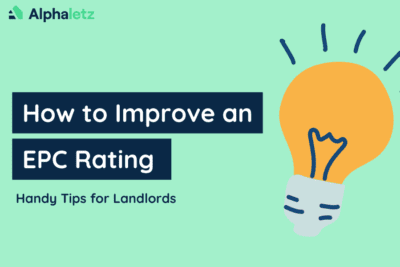With the belt around energy efficiency regulation slowly tightening, Landlords are left with no other choice than to foot the bill of costly improvements to their rental properties to meet minimum energy efficiency standards.
However, with the target of an EPC rating of C and above by 2025, the costs are starting to add up leaving some Landlords feeling like they have to sell up.

What some Landlords don’t know is that the rules around the MEES for commercial properties is set to change on the 1st April 2023. If you’re unaware of the upcoming legislation & fail to comply, you could face a hefty penalty!
What is MEES?
MEES, or the Minimum Energy Efficiency Standard is a set of standards enforced by regulations that were put in place in 2018.
The purpose of MEES is to ensure that properties being let out meet energy efficiency expectations dictated by the government.
MEES applies to both commercial & domestic properties, however, the requirements from both may vary. The changes that take effect on 1st April 2023 will be based on commercial properties.
Minimum Energy Efficiency Changes in April 2023
From the 1st April 2023, commercial properties being rented out in England will need to hold an EPC rating above what the government deems as substandard. This will not apply to you if you are of course exempt.
Continuing to let a property which has a ‘sub-standard’ EPC rating can lead to publication & financial penalties of up to £150,000 for commercial properties.
What is classed as 'Sub-Standard?'
In England and Wales, a ‘sub-standard’ commercial property has, by government definition, an EPC rating of at least an F or G.
What are the Government's long term plans?
With the release of the transformation of the UK’s energy system & delivery of net zero white paper in 2020, the government outlined plans to ensure that all commercial properties meet a minimum EPC rating of C by 2027, and B by 2030.
On top of this, all privately let properties in England & Wales will need to meet a minimum EPC rating of C by 2025 by law!
In November, Rishi Sunak stated in his speech at the COP27 summit that the UK was on track to reach its goal of reducing emissions by 67% by 2030 in hopes of delivering net zero by 2050.
EPC Exemptions
With the deadline in mind, there are a few exemptions that Landlords can apply for. These are, but aren’t limited to:
Seven Year Payback Exemption
This exemption is in place for Landlords who can adequately prove that any building work taken out to improve the EPC rating of the property won’t be paid back via energy bill savings in the next 7 years.
Devaluation Exemption
The Landlord can prove (with the correct paperwork from an independent surveyor) that the works carried out will devalue their property by 5% or more of the market value.
Consent Denied by Tenant / Third Parties
This exemption will only be granted to Landlords who are unable to gain consent from their tenant or a third party to carry out improvement works.
No More Improvements to Make
If the Landlord has carried out every necessary step to improve the property’s EPC rating and the property is still deemed sub-standard, the Landlord can request an exemption.

You are also able to apply for an exemption if:
- Your property is not required by law to have an EPC.
- Your property is let on a tenancy consisting of 99+ years.
- Your tenancy has already existed for 6 months or less (unless the tenant has been there for a time period of 12 months or more.)
What properties do NOT need an EPC?
Here are a list of properties that aren’t required by law to have an EPC in place.
- Buildings that are temporary and will exist for 2 years or less.
- Industrial buildings or workshops that don’t use a lot of energy.
- Residential homes/buildings used for less than 4 months a year.
- Holiday accommodation let for less than 4 months a year.
- A temple, church or other place of worship.
- Unsafe properties.
- Properties being demolished.
What can I do from here?
Check your property’s Energy Efficiency rating using the Government’s Website.
As a small tip, with recent changes in carbon factors & building regulations, you might be subject to an increase in your EPC rating with a simple reassessment.
PLEASE NOTE: If you already have a lease in place where the expiration date exceeds April 2023, you’ll need to ensure you have rights to enter the property so you can attempt to improve the EPC rating if you do not meet the minimum requirements.
If you meet the criteria listed above for exemption, you should visit the PRS Exemptions Register and use their online service to claim your exemption & avoid facing a penalty. It’s worth noting that exemptions are time limited and none will exceed 5 years.
EPCs, easy as 1-2-3.
Looking to renew your EPC? In just a few clicks, you can get a reliable quote through our partner MyConstructor.



